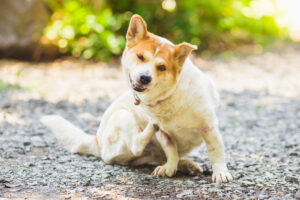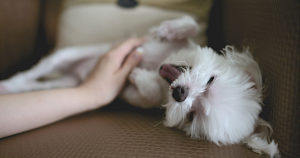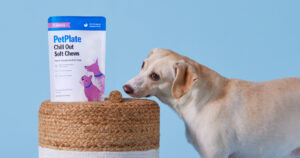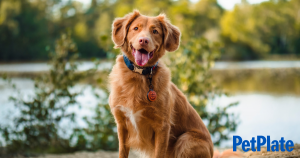Anxiety Awareness Month
It can be hard to tell our dog’s day-to-day’ moods, especially when it comes to anxiety. Their anxiety often comes from things like fireworks, trips to the vet, or being away from their home and family. Small changes to your dog’s routine might give them anxiety as well, and it might manifest in ways you might not expect. We want to help you easily identify symptoms of anxiety and the consequences anxiety can have on your pup’s health, and give you the tools to better deal with canine anxiety.
Anxiety happens

A lot of dogs have anxiety surrounding loud noises, like fireworks or the vacuum, and changes in their environment. However, anxiety can be genetic with certain breeds, like Toy Breeds and Working Breeds. Some rescue pups will have heightened anxiety, as well, especially if they have a history of abuse or neglect. Later in life, if your dog has health issues they may begin to have anxiety around being picked up or touched if they are in pain. If they begin to have issues with their sight or hearing, anxiety can come up, as well.
Health risks

The health risks in dogs are very similar to those in humans. If your pup suffers from anxiety it can lead to digestive issues, tense muscles, weight changes, heart problems, and behavioral issues. If anxiety is left untreated, it can compromise your dog’s immune system, which can make them more susceptible to infections or illnesses. It can also lead to irritated skin, and long term health issues that can lower your dog’s quality of life.
How to help

It is important to remember that your vet will always have the best advice on how to treat your dog’s health, but here are a few ways to keep your dog’s anxiety low so they can stay healthy. Make sure they have a safe space where they feel comfortable enough to relax, especially if you are in the middle of moving or your pup is spending some time at doggy daycare. Places like their crate or bed are great reminders of safety and calm. If they are away from home overnight, have them bring a blanket that smells like home or a toy that they love. Try to keep to some routine, even if other parts of you or your dog’s day are in flux.
If your dog seems to have significant or persistent anxiety, you can try our Calming Chews, or reach out to your vet to see if a medication may be right for your dog. A lot of exercise and love from their pet parents are also easy ways to steady their anxiety!

Our biggest piece of advice is maybe one you have heard if you are a human who has some anxiety–control the controllable. Remember to stay calm in stressful situations; your pup takes their cues from you!



